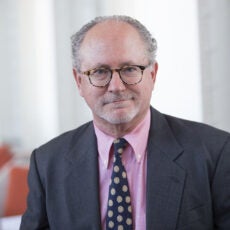
Global climate goals can be heavily influenced by local and regional policies, but only if those policies have local support and benefit local communities. This study explores energy policies that maximize outcomes for the Philadelphia region.
This research was made possible through a generous gift from Carl Goldsmith (W’88).
Executive Summary
Over the past year, the Kleinman Center developed the Pathways project to better support energy policy-making at the local and regional levels. We have argued for a new approach in a series of essays in diverse venues, including newspapers and scientific journals. We have socialized the approach in a series of presentations, including at conferences of subnational governments and in meetings with federal agencies. We have also supported teams of researchers to build a long-term project around the approach. This report documents our progress through the project’s first phase, which generated our regional “pathways” and refined our approach to decision support.
Several guiding questions motivated this project:
- First, what are the local net benefits of various energy-related policy strategies? This question differs from what is asked in most assessments of subnational policy options, which typically inquires “how much emissions reduction can be achieved in our city or region?” or “is an 80 percent reduction in local emissions by year 2050 feasible?” Maximizing local net benefits and treating emissions reductions as an output derived from local policy concerns provides a far more relevant and reliable basis for local decision making and for predicting the sustained efforts of subnational governments over the longer term.
- Second, what are the local co-benefits of mitigation and adaptation policies? Local efforts at emissions reductions are likely to generate far more local net benefits from improved air quality than from climate change mitigation. This creates a potential—but not self-implementing—alignment between local and global policy efforts. Also, any local policy that generates both mitigation and adaptation benefits creates another opportunity to leverage local efforts to achieve global impacts.
- Third, what policy options and debates about energy characterize actual decision making at the local and regional scale? Rather than backward-mapping from a global policy problem (such as deep decarbonization), we propose to tie our analysis to interests, issues, and opportunities already mobilized in a specific region. This approach better reflects the realities of local decision making.
Decision support research begins with the engagement of decision makers. We built on our longstanding relationships with key partners and convened teams of researchers, advisers, and stakeholders. They developed different policy strategies based on policy discussions taking place within the Philadelphia region. We then translated these strategies into model inputs that can be used to estimate local net benefits associated with each strategy over time.
The Kleinman Center worked with ICF, a global consulting firm, to recruit stakeholders who were then tasked with combining several strategies into three ambitious and distinct pathways to mid-century in the region. The “Grid” pathway, which focuses on modernizing the region’s electricity grid and electrifying key sectors, was led by PECO (Pennsylvania’s largest electric and natural gas utility); the “Gas Works” pathway, which seeks to take advantage of the region’s location and infrastructure to capitalize on Pennsylvania’s shale boom, was developed in consultation with Philadelphia Gas Works (PGW); and finally, the “Edge” pathway, which seeks to leverage distributed resources and storage to enhance the region’s energy system was led by the Philadelphia Energy Authority (PEA).
These pathway leaders and participants were asked to define energy strategies out to mid-century that would maximize the local net benefits to the Philadelphia region. The only constraint we gave each group was that they could assume no significant change in state or federal policy. After preliminary stakeholder discussions, which spanned four months, it became clear that uncertainty was hindering the kind of thinking that we thought would emerge from this pathway design process. Uncertainty about the future in many ways limited stakeholders to proposing incremental changes in their strategies, rather than developing the far-reaching visions that we expected. Any strategy that was too ambitious became difficult to defend without relying on assumptions about highly uncertain policy and technology changes. As a result, three very realistic and actionable pathways were developed that deviated only modestly from a business-as-usual scenario.
We concluded that our characterization of the region as deadlocked over competing and significantly divergent visions of the region’s energy future was wrong. Uncertainty rather than deadlock is what limits decision making on Philadelphia’s energy future. Uncertainty about technology, policy, and climate impacts makes it difficult to elaborate strategies for more than incremental departures from the status quo.
In the remainder of this report, we present the characterization of the stakeholder pathways and strategies constructed by ICF in partnership with the Kleinman Center. Each pathway consists of policy and program strategies that would generate estimated impacts in capital and operating costs, electricity and fuel consumption, and greenhouse gas and local air quality emissions. In future phases of the Comparative Pathways project, we will compare the local net benefits of stakeholder strategies for regional energy transition as well as compare the robustness of many different strategies under different futures that regional decision makers may face.
Cornelia Colijn
Executive DirectorCornelia Colijn is the executive director of the Kleinman Center. She envisions, plans, and manages all center programming, while building connections with students, faculty, and leaders in the energy industry.
Mark Alan Hughes
Director EmeritusMark Alan Hughes is director emeritus of the Kleinman Center. During his time as faculty director, he led the Center and wrote on topics ranging from deep decarbonization to the future of Philadelphia’s energy landscape.
Oscar Serpell
Deputy DirectorOscar Serpell oversees all student programming, alumni engagement, faculty and student grants, and visiting scholars. He is also a researcher, writer, and policy analyst working on research initiatives with students and Center partners.



